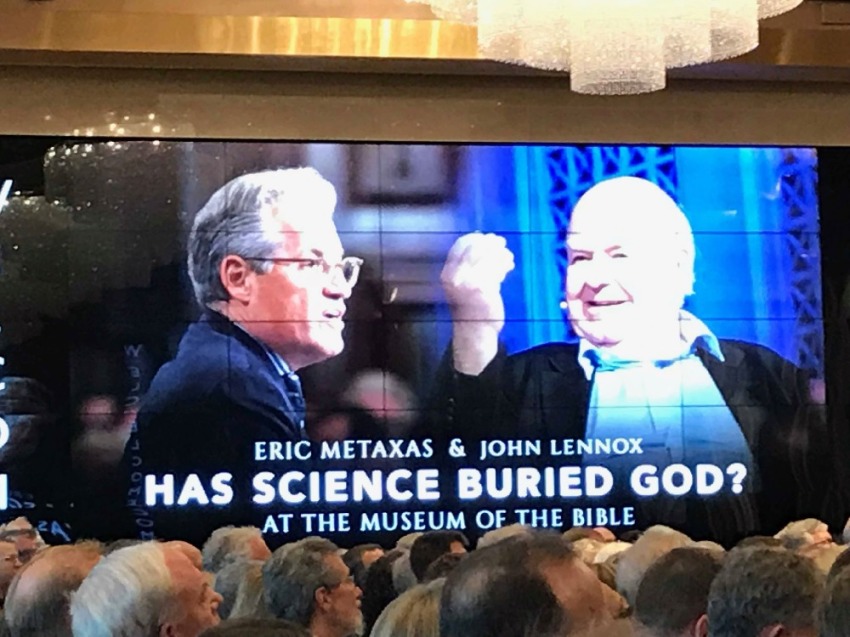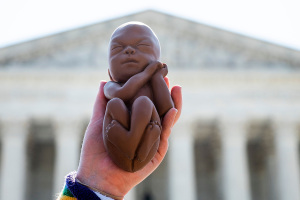Science cannot bury God but it can bury atheism: John Lennox

WASHINGTON — Science cannot bury God, as some atheists claim, but it can bury atheism, according to an emeritus professor at Oxford University with a Ph.D. in mathematics.
Gathered before hundreds at the Museum of the Bible Thursday for a Socrates in the City event hosted by author Eric Metaxas in the lead-up to Colson Center's annual Wilberforce Weekend, Irish mathematician John Lennox engaged the question: Has science buried God?
Atheism, theism, pantheism have been around for millennia, Lennox said, when asked by Metaxas about when the idea crept into to mainstream Western thought that science and Christian faith were at odds.
Isaac Newton "laid out the universe beautifully in terms of mathematics and discovered that mathematics gave a brilliant description of how things work, and it led to the idea that the universe was essentially a mechanical artifact. And then people began to think 'Well, it seems to run very well on its own and we are able to research it without referring to any concept of someone who set it going.' So the idea of God setting it going started to recede into the past," he said.
By the 18th century, deism — the belief that God exists but He is largely uninvolved in the affairs of humanity — was prevalent and subsequently followed by the Enlightenment, where the thinkers of the day replaced God with human reason.
"The social situation in England was such that when you got to the time of [Charles] Darwin and [Aldous] Huxley it was more to it than simply using science to bury God. Huxley, who was very famous, he was furious at the existence of amateur scientists, some of them were very brilliant ... who challenged him."
Huxley's idea was to have the church scientific and change churches into where they would worship "Sophia," the goddess of wisdom, Lennox continued.
But the shift away from a God-centered view of the cosmos at that time in the West was compounded by a professing Christian church that had no reality and was compromised morally, he went on to say.
"And that turned the tables very rapidly, I think," he said.
The thinking then became that God was fine for a while but He is no longer necessary, Lennox explained, as Steven Hawking asserted in his book The Grand Design.
The notion that as science increases God decreases is inadequate, he said, and that results in the "God of the gaps" fallacy, which is intellectually lazy: "I can't explain it, therefore, God did it."
"And that is a profound misunderstanding of the nature of explanation. Explaining explanation is a very important thing," Lennox said.
"The mistake that is made, and [atheist author] Richard Dawkins pushed this, is that God and science compete as explanations, so you have to choose between them."
But that's a false choice, he elaborated. Such thinkers are making two key mistakes, the first being that they have the wrong concept of God.
When Lennox was growing up in Ireland and would refer to God, people knew he was speaking of the Creator God in the Bible. Yet atheists like Steven Hawking think Lennox is speaking of God who resembles an ancient Greek deity like Zeus and then automatically assume Christians default to the God of the gaps, the "I can't explain lightning so I invent a god when you do some atmospheric physics that god disappears."
"The most important thing to realize is that the God of the Bible is not a god of the gaps," Lennox stressed.
The first sentence of the Bible — "In the beginning God created the heavens and the earth" — linguistically is a merism, which includes the bits we do and don't understand.
"If you understand art, you can follow the details of a Rembrandt painting better than I can. The more you understand, the more you admire the genius, and that is just so important. And so Newton's faith and my faith, being in God, increases, because the heavens are constantly and increasingly declaring his glory," he stressed, alluding to Psalm 19.
But the reason he thinks that science can bury atheism is because science can be done, Lennox said. If you start believing that there is a rational intelligence behind the universe, then doing science is reasonable, and the Christian has a rationale for doing science, he said.
When atheists ask him how it is possible for him to be both a scientist and a Christian he inquires of them: "What do you do science with?" and he points to his head to make it obvious.
Most of them reply that they do science with their brains. Lennox then lets them simmer on that thought and then asks them to tell him about their brains with which they do science.
"What do you really believe about it? Give me a short history of the brain," he presses them.
They often say something like "that's relatively easy because the brain is the end product of the mindless unguided process," he said.
"And I look at them and I sometimes smile and I say: 'And you trust it?'"
"Be honest with me, if you knew that the computer you use every day in your lab was the end product of a mindless, unguided process would you trust it?
Lennox has asked that question to dozens of internationally acclaimed scientists, and he always forces them to answer. Each of them always responds with a "no."
"I see you have a problem then. Here you're doing science. And I'm asking you for a rational justification of your faith," he tells them.
"We've been hugely miseducated to think that there is science here and faith there," he said, gesturing as if the two were completely distinct categories.
"Science involves faith. You don't do science unless it can be done. More precisely, you don't do it unless you believe the universe is at least in part rationally intelligible."



























